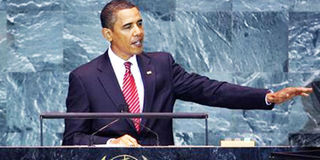Premium
U.N. council urges nuclear disarmament, Obama presides

President Barack Obama addresses the 64th United Nations General Assembly, at the U.N. headquarters in New York on September 23, 2009. Photo/REUTERS
The U.N. Security Council, at a summit chaired by U.S. President Barack Obama, unanimously approved a resolution on Thursday calling on nuclear weapons states to scrap their arsenals.
Obama presided over the meeting at U.N. headquarters in Manhattan, the first time a U.S. president has chaired a Security Council summit since it was formed in 1946.
It was only the fifth time the Security Council has met at the level of heads of state and government and the first to focus exclusively on nuclear proliferation and disarmament.
"I called for this (summit) so that we may address at the highest level a fundamental threat to the security of all peoples and all nations -- the spread and use of nuclear weapons," Obama told the council.
"This very institution was founded at the dawn of the atomic age, in part because man's capacity to kill had to be contained, and although we averted a nuclear nightmare during the Cold War, we now face proliferation of a scope and complexity that demands new strategies and new approaches."
Obama said the next year would be "absolutely critical" in determining whether efforts to stop the spread and use of nuclear weapons were successful.
The U.S.-drafted resolution called for "further efforts in the sphere of nuclear disarmament" and urged all countries that have not signed the 1970 nuclear Non-Proliferation Treaty (NPT) to do so.
The resolution also called for an end to the proliferation of atomic weapons and demanded that parties to the NPT keep their promises not to develop atomic warheads.
All five permanent Security Council members -- the United States, Russia, China, Britain and France -- have atom bombs.
Signatories to the NPT without nuclear arsenals have complained for decades that the world's official nuclear powers have failed to live up to their commitments while seeking to prevent other countries from joining the "nuclear club."
Change in U.S. disarmament policy
Diplomats and analysts said the U.S. decision to organize the summit highlighted a sharp shift on disarmament policy taken by the Obama administration. Obama's predecessor, George W. Bush, angered many NPT members by ignoring disarmament commitments undertaken by previous U.S. governments.
The resolution also urged "other states" outside the NPT to join disarmament efforts to help rid the world of atom bombs.
These states, not named in the resolution, are Pakistan and India, which have not signed the NPT but are known to have atomic arsenals, and Israel, which neither confirms nor denies having nuclear arms but is believed to have a sizable stockpile of warheads.
North Korea withdrew from the NPT in 2003 and tested its first nuclear device in 2006 and another earlier this year.
The resolution also called on U.N. member states to ratify a treaty banning nuclear tests and supported negotiations on a pact banning the production of fissile material for warheads.
The two countries that the United States and other Western powers have singled out as the biggest proliferation threats -- Iran and North Korea -- were not named in the resolution.
But diplomats said it was clear they were the targets when the resolution spoke of "current major challenges to the non-proliferation regime."
Obama and Russian President Dmitry Medvedev discussed disarmament among other issues at their meeting on Wednesday. Both men spoke about Russian-U.S. plans for a new bilateral treaty to reduce their nuclear stockpiles.
Obama and Medvedev also agreed Iran may have to face a fourth round of U.N. sanctions if it rejects international demands to freeze sensitive nuclear work and fails to cooperate with U.N. inspectors.




